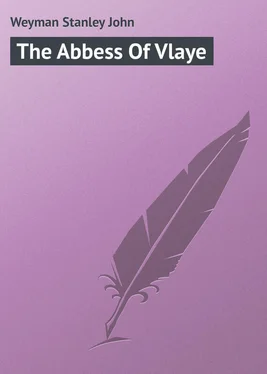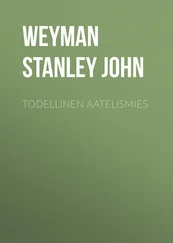Stanley Weyman - The Abbess Of Vlaye
Здесь есть возможность читать онлайн «Stanley Weyman - The Abbess Of Vlaye» — ознакомительный отрывок электронной книги совершенно бесплатно, а после прочтения отрывка купить полную версию. В некоторых случаях можно слушать аудио, скачать через торрент в формате fb2 и присутствует краткое содержание. Жанр: foreign_prose, на английском языке. Описание произведения, (предисловие) а так же отзывы посетителей доступны на портале библиотеки ЛибКат.
- Название:The Abbess Of Vlaye
- Автор:
- Жанр:
- Год:неизвестен
- ISBN:нет данных
- Рейтинг книги:5 / 5. Голосов: 1
-
Избранное:Добавить в избранное
- Отзывы:
-
Ваша оценка:
- 100
- 1
- 2
- 3
- 4
- 5
The Abbess Of Vlaye: краткое содержание, описание и аннотация
Предлагаем к чтению аннотацию, описание, краткое содержание или предисловие (зависит от того, что написал сам автор книги «The Abbess Of Vlaye»). Если вы не нашли необходимую информацию о книге — напишите в комментариях, мы постараемся отыскать её.
The Abbess Of Vlaye — читать онлайн ознакомительный отрывок
Ниже представлен текст книги, разбитый по страницам. Система сохранения места последней прочитанной страницы, позволяет с удобством читать онлайн бесплатно книгу «The Abbess Of Vlaye», без необходимости каждый раз заново искать на чём Вы остановились. Поставьте закладку, и сможете в любой момент перейти на страницу, на которой закончили чтение.
Интервал:
Закладка:
She stood staring at him in astonishment, and until her companion at the well came forward made no reply. Something in the movements of this second figure as it crossed the court struck the eye as abnormal, but it was only when it came quite close that the stranger discovered that the lad before him was slightly hump-backed.
"You have met with a mischance," the youth said with awkward diffidence.
"Yes."
"Whatever the cause, you are welcome. Go, Bonne," the young man continued, addressing the girl, "it is better you went-and tell my father that a gentleman is here craving shelter. When I have stabled his horse I will bring him in. This way, if you please!" the lad continued, turning to lead the way to the stables, but casting from moment to moment timid looks at his guest. "The place is rough, but such as it is, it is at your service. Have you ridden far to-day, if it please you?"
"From Rochechouart."
"It is well we had not closed the gates," the youth answered shyly; "we close them an hour after sunset by rule. But to-day the men have been making hay, and we sup late."
The stranger expressed his obligation, and, following his guide, led his horse through one of the doors of a long range of stabling built against the western wall of the courtyard. Within all was dark, and he waited while his companion fetched a lanthorn. The light, when it came, disclosed a sad show of empty mangers, broken racks, and roof beams hung with cobwebs. Rain and sunshine, it was evident, entered through more holes than one, and round the men's heads a couple of bats, startled by the lanthorn-light, flitted noiselessly to and fro.
At the farther end of the place, the roof above three or four stalls showed signs of recent repair; and here the young man invited his guest to place his beast.
"But I shall be turning out your horses," the stranger objected.
The youth laughed a little awry. "There's but my father's gelding," he said, "and old Panza the pony. And they are in the ox-stable where they have company. This," he added, pointing to the roof, "was made good for my sister the Abbess's horses."
The guest nodded, and, after examining his beast's injuries, bathed its knees with fresh water; then producing a bandage from his saddle-bag he soaked it in the water and skilfully wound it round the strained fetlock. The lad held the lanthorn, envy, mingled with admiration, growing in his eyes as he watched the other's skilled hands and method.
"You are well used to horses?" he said.
"Tolerably," des Ageaux answered, looking up. "Are not you?" For in those days it was an essential part of a gentleman's education.
The lad sighed. "Not to horses of this sort," he said, shrugging his shoulders. And des Ageaux took note of the sigh and the words, but said nothing. Instead he removed his sword and pistols from his saddle, and would have taken up his bags also, but the young man interposed and took possession of them. A moment and the two were crossing the darkened courtyard. The light of the lanthorn made it difficult to see aught beyond the circle of its rays, but the stranger noticed that the château consisted half of a steep-roofed house, and half of the two round towers he had seen; house and towers standing in one long line. Two rickety wooden bridges led across a moat to two doors, the one set in the inner of the two towers-probably this was the ancient entrance-the other in the more modern part.
On the bridge leading to the latter two serving-men with lights were awaiting them. The nearer domestic advanced, bowing. "M. le Vicomte will descend if" – and then, after a pause, speaking more stiffly, "M. le Vicomte has not yet heard whom he has the honour of entertaining."
"I have no pretensions to put him to the trouble of descending," the traveller answered politely. "Say if you please that a gentleman of Brittany seeks shelter for the night, and would fain pay his respects to M. le Vicomte at his convenience."
The servant bowed, and turning with ceremony, led the way into a bare, dimly-lit hall open to its steep oaken roof, and not measurably more comfortable or less draughty than the stable. Here and there dusty blazonings looked down out of the darkness, or rusty weapons left solitary in racks too large for them gave back gleams of light. In the middle of the stone floor a trestle table such as might have borne the weight of huge sirloins and great bustards, and feasted two score men-at-arms in the days of the great Francis, supported a litter of shabby odds and ends; old black-jacks jostling riding-spurs, and a leaping-pole lying hard by a drenching-horn. An open door on the tower side of the hall presented the one point of warmth in the apartment, for through it entered a stream of ruddy light and an odour that announced where the kitchen lay.
But if this were the dining-hall? If the guest felt alarm on this point he was soon reassured. The servant conducted him up a short flight of six steps which rose in one corner. The hall, in truth, huge as it seemed in its dreary emptiness, was but one half of the original hall. The leftward half had been partitioned off and converted into two storeys-the lower story raised a little from the ground for the sake of dryness-of more modern chambers. More modern; but if that into which the guest was ushered, a square room not unhandsome in its proportions, stood for sample, scarcely more cheerful. The hangings on the walls were of old Sarazinois, but worn and faded to the colour of dust. Carpets of leather covered the floor, but they were in holes and of a like hue; while the square stools clad in velvet and gilt-nailed, which stood against the walls, were threadbare of stuff and tarnished of nails. In winter, warmed by the ruddy blaze of a generous fire, and well sconced, and filled with pleasant company seated about a well-spread board, the room might have passed muster and even conduced to ease. But as the dusky frame of a table, lighted by four poor candles-that strove in vain with the vast obscurity-and set with no great, store of provision, it wore an air of meagreness not a whit removed from poverty.
The man who stood beside the table in the light of the candles, and formed the life of the picture, blended well with the furnishings. He was tall and thin, with stooping shoulders and a high-nosed face, that in youth had been masterful and now was peevish and weary. He wore a sword and much faded lace, and on the appearance of his guest moved forward a pace and halted, with the precision and stiffness of clockwork. "I have the honour," he began, "to welcome, I believe-"
"A gentleman of Brittany," des Ageaux answered, bowing low. It by no means suited his plans to be recognised. "And one, M. le Vicomte, who respectfully craves a night's hospitality."
"Which the château of Villeneuve-l'Abbesse," the Vicomte replied with grandeur, "has often granted to the greatest, nor" – he waved his hand with formal grace-"ever refused to the meanest. They have attended, I trust," he continued with the air of one who, at the head of a great household, knows, none the less, how to think for his guests, "to your people, sir?"
"Alas, M. le Vicomte," des Ageaux answered, a faint twinkle in his eyes belying the humility of his tone, "I have none; I am travelling alone."
"Alone?" The Vicomte repeated the word in a tone of wonder. "You have no servants with you-at all?"
"Alas-no."
"Is it possible?"
Des Ageaux shrugged his shoulders, and spread out his hands. "In these days, M. le Vicomte, yes."
The Vicomte seemed by the droop of his shoulders to admit the plea; perhaps because the other's eyes strayed involuntarily to the shabby furniture. He shook his head gloomily. "Since Coutras-" he began, and then, considering that he was unbending too soon, he broke off. "You met with some accident, I believe, sir?" he said. "But first, I did not catch your name?"
Читать дальшеИнтервал:
Закладка:
Похожие книги на «The Abbess Of Vlaye»
Представляем Вашему вниманию похожие книги на «The Abbess Of Vlaye» списком для выбора. Мы отобрали схожую по названию и смыслу литературу в надежде предоставить читателям больше вариантов отыскать новые, интересные, ещё непрочитанные произведения.
Обсуждение, отзывы о книге «The Abbess Of Vlaye» и просто собственные мнения читателей. Оставьте ваши комментарии, напишите, что Вы думаете о произведении, его смысле или главных героях. Укажите что конкретно понравилось, а что нет, и почему Вы так считаете.












